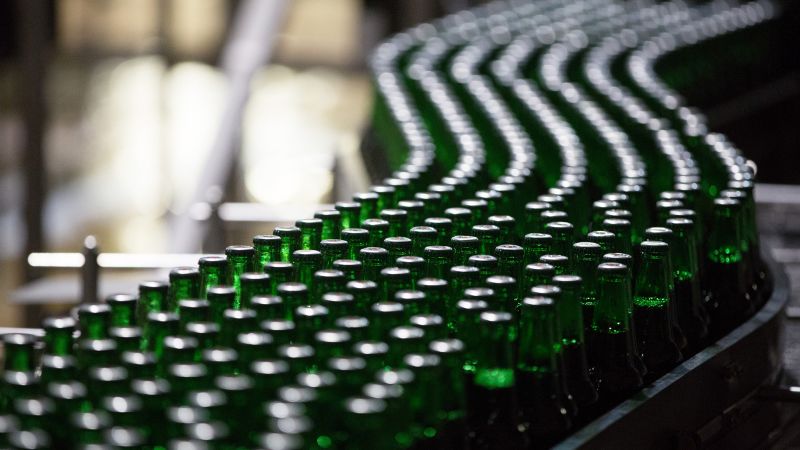More than 1,000 major companies pledged to leave Russia after Vladimir Putin launched his devastating war in Ukraine, but some well-known firms stand accused by researchers of violating their pledge.
Not every company on the list left, but more than 1,000 exited. That unprecedented corporate exodus, championed and chronicled by Yale professor Jeff Sonnenfeld, dealt a serious financial and symbolic blow to Moscow and the Russian economy.
Now, as Russia’s brutal war in Ukraine blows past the 500-day mark, Sonnenfeld and his team are naming and shaming a slew of companies they accuse of breaking their promises to leave or at least drastically scale back their presence in Russia, including well-known companies like Heineken, Unilever, Philip Morris and Oreo maker Mondelez.
The Yale research, shared exclusively with CNN, is based on whistleblowers, on-the-ground experts, students operating inside Russia, corporate documents and news media reports.
“These companies are breaking their promises. They are functioning as wartime profiteers,” Sonnenfeld told CNN in an interview. “It’s beyond disappointing. It’s shameful and unethical.”
Sonnenfeld, who has testified before Congress about companies leaving Russia, is not accusing these corporations of breaking the law. Instead, he argues that by staying in Russia, they are breaking a moral code and simultaneously “self-immolating their own brands.”
“Consumers should realize that by supporting these companies, they’re endorsing something that fuels Putin’s war machine,” he said.
The “poster child” for this problem is the popular Dutch brewing giant Heineken, Sonnenfeld said.
In March 2022, just one month after the invasion of Ukraine, Heineken won praise for promising to leave Russia. Yale even gave Heineken its highest grade of “A,” reserved for companies making a “clean break” with the country, on its scorecard of companies’ relationship with Russia.
However, 16 months later Heineken still has seven breweries and 1,800 employees in Russia, according to Yale. Not only that, but Heineken has since launched a series of new brands in Russia, gobbling up market share caused by the exodus of other major beer brands.
“They are not pulling out. They are doubling down,” said Steven Tian, director of research at the Yale Chief Executive Leadership Institute.
Yale has now downgraded Heineken to a “D,” finding that the company “continues to drag its heels on actually exiting, under the guise that it is awaiting Russian regulatory approvals for its sale to go through.”
By contrast, other major companies – including BP and ExxonMobil – took massive writedowns to fulfill their commitments to leave Russia.
“It’s nothing but institutional inertia or ideological arrogance. It makes no sense,” Sonnenfeld said. “The symbolism today is an implied endorsement of the Putin regime.”
In a statement to CNN, a spokesperson for Heineken called the war in Ukraine a “terrible human tragedy” and said the company is “committed to leaving Russia.” Heineken said it has stopped selling the Heineken brand in Russia and found a prospective buyer of its Russia business. However, that potential deal, submitted to Russian authorities in April 2023, is still pending regulatory approval, the company said.
“We expect a significant financial loss to the Heineken company. The local operation is continuing so that the organization can protect the livelihoods of our people by avoiding bankruptcy or nationalization,” Heineken said in the statement.
In March 2022, snack and candy giant Mondelez promised to scale back “all non-essential activities in Russia while helping maintain continuity of the food supply.” Mondelez said it would focus its operation on “basic offerings.”
However, Mondelez – the company behind Oreo cookies, Triscuit crackers and Nabisco snacks, says it still employs 3,000 people in Russia. The Yale research said Mondelez shows “no tangible signs of progress towards exiting” and continues to do business in Russia. That’s despite boycotts that have hit Mondelez from European grocers and other companies refusing to order and stock the company’s products.
Mondelez did not respond to a request for comment but in a statement last month the company said it has scaled down its activities and halted product launches and ad spending in Russia.
Unilever, the company behind Dove soap, Ben & Jerry’s ice cream and Lipton tea, pledged to only sell “essential” goods to Russia.
Yet Unilever is still selling Cornetto ice cream and other consumer goods in Russia, according to Sonnenfeld’s team.
Unilever declined to comment but referred questions to a February statement where the company said it continues to “condemn the war in Ukraine as a brutal and senseless act by the Russian state” but explained that leaving Russia is “not straightforward” without handing the assets to the government or hurting employees there.
The Moral Rating Agency, an organization that tracks companies’ promises to leave Russia, estimates that Unilever’s support for the Russian economy equates to about $712 million a year.
“A bar of Dove soap starts to look pretty dirty when there are enough of them being produced to purchase a Russian tank,” Mark Dixon, founder of the Moral Rating Agency, said in a statement last week.
Much like Unilever and Mondelez, Nestle also pledged last year to only sell “essential” products like baby formula in Russia.
Yet the Yale researchers found the maker of Kit Kat candy bars, Nescafe instant coffee and Purina is still selling pet food, chocolate bars and other nonessentials in Russia.
Nestle did not respond to a request for comment.
Despite its March 2022 pledge to get out of Russia, co-working giant WeWork still allows users to book work spaces in Moscow.
In a statement to CNN, a WeWork spokesperson said the company still has “full intentions to discontinue operations in Russia,” adding that it is in the “final stages of our divestiture plans.”
Tobacco giant Philip Morris said last year it was working hard to get out of Russia. But today Philip Morris is one of the largest remaining multinationals in Russia, with an estimated $2.5 billion in assets including several plants there, according to the Yale research.
In a statement to CNN, a Philip Morris spokesperson said the “situation is complex” and the company is “constrained by recent regulatory developments in Russia, including restrictive conditions that must be met for any divestment transaction to be approved by the authorities – and restrictions resulting from international regulations.”
Several American fast-casual chains are still operating in Russia, more than a year after McDonald’s and Starbucks decided to exit the country.
Sonnenfeld’s team found that Sbarro Pizza still has a location operating in Moscow that appears to be supported by a Russian-language website.
Sbarro did not respond to a request for comment.
American fast-food chain Carl’s Jr. still has a presence in Russia and even showcases its food on a Russian-language Instagram page.
In a statement to CNN, Carl’s Jr. parent CKE Restaurants Holdings acknowledged the company has 17 franchised restaurants in Russia but said they are all independently owned and operated. Carl’s Jr. added that the Instagram page is not owned or operated by CKE.
Likewise, Yale found that there are still independently-owned franchisees of TGI Fridays operating in Russia.
TGI Fridays did not respond to a request for comment, but in a March 2022 statement the company said only local franchisees can decide whether to stay open and pledged to donate proceeds from its franchisee fees to a group supporting Ukraine and its refugees.
Some companies have defended their continued presence in Russia by citing a desire to avoid causing more problems for employees and customers based in Russia.
“This is one of those things that are easy to say but hard to do – and there is a financial hit that can come with it,” said Tim Calkins, marketing professor at Northwestern University’s Kellogg School of Management.
Calkins said there are a lot of concerns atop consumers’ minds right now and this may not be one of them.
“I suspect companies don’t feel a lot of pressure to follow through on their pledges,” he said.
Sonnenfeld rejects that argument, saying the goal of the corporate exodus is to increase pressure on Putin’s regime. As a model, he pointed to the divestment movement by major Western brands from South Africa in the late 1980s during Apartheid.
“The idea is to increase the level of discomfort,” said Sonnenfeld, “so they start to ask who the author of their misfortune is.”
Read the full article here





